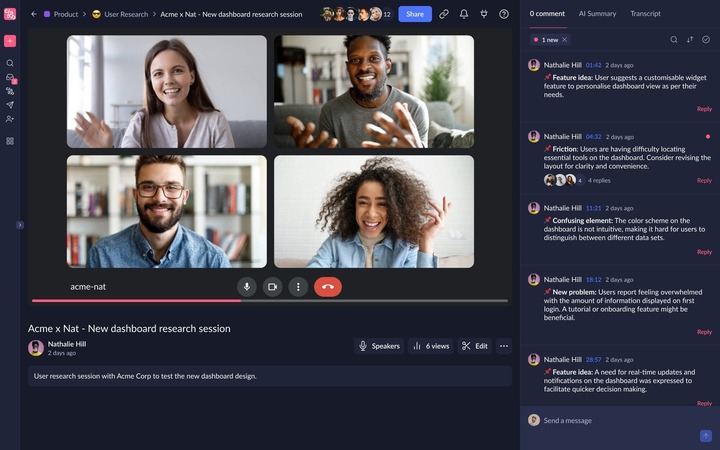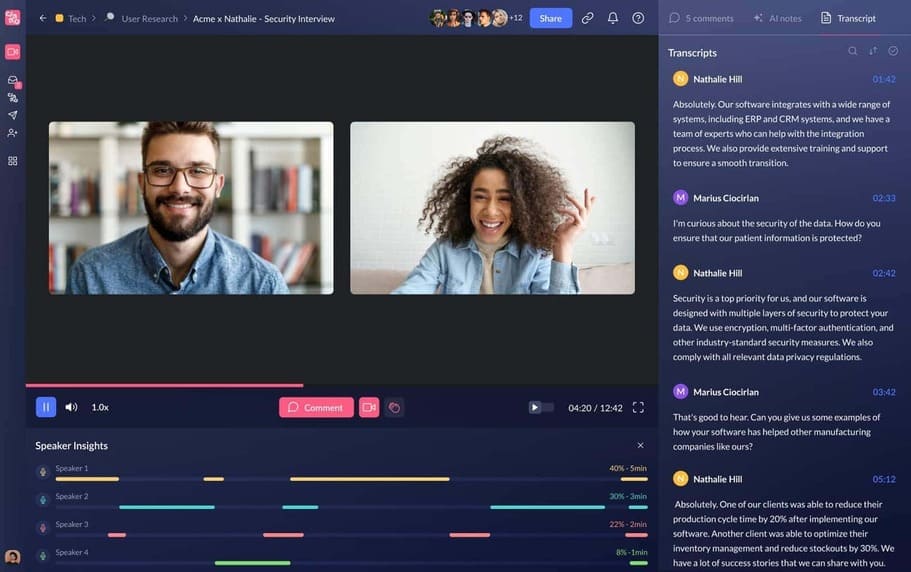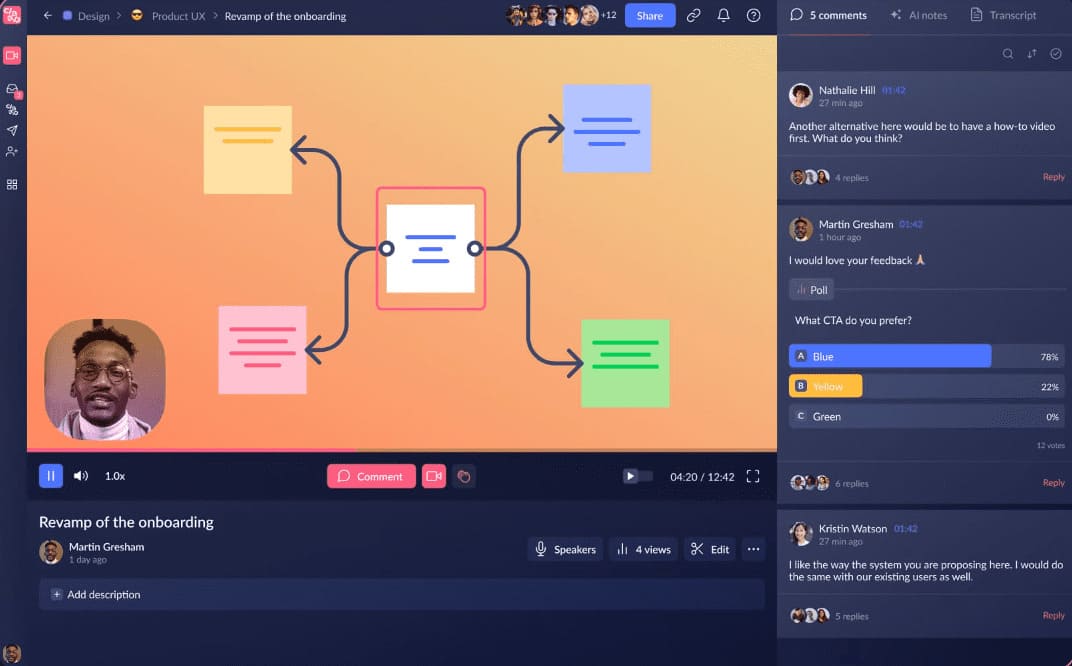What is an interview scoring sheet
If you’re used to interviewing candidates for job positions, you may already be using interview templates. But you can be even more efficient by using interview scoring sheets.
Interview scoring sheets (also known as interview scorecards) are support tools used to evaluate candidates based on predefined criteria.
But let me clarify a bit why you should use interview scoring sheets.
Why should you use an interview scoring sheet

To accurately evaluate the candidate
It’s an obvious one, but it’s the main utility of an interview scoring sheet. No more relying on unclear memories: the interview scoring sheet will be your hiring cheat code. And it will help you make smart and objective decisions about candidates..
To have standardized interviews
Having an interview scoring sheet means that you can have standardized interviews. If there are several interviewers, you can have the same set of questions and the same rating method.
It may require a bit of time for all the interviewers (maybe you’re included) to understand the expectations for each question and to have similar grading methods. But in the end, an interview scorecard is definitely the best way to guarantee fair interview conditions for candidates.
Keep a record of the interview.
If you interview many candidates, you can easily be lost: an interview scoring sheet, with the personal comments you will write will help you remember the different candidates and be more efficient when it comes to reporting the performance.
You can also use Claap, and keep an actual record of the interview. Claap will be your interview companion that will not only record all your interviews but also automatically take notes for you!

The 7 elements to include in your interview scoring sheet
A general information section
This section will help you classify your interview scoring sheets afterwards. It will also be quite useful if you have to send the scoring sheet to a third party (HR team for instance). It should basically contain:
- The object of the interview (basically the job title)
- The date and time of the interview
- The candidate and interviewers’ names
A rating system
The rating system is what makes your interview scoring sheet good. It should allow you to accurately evaluate the candidate’s performance. For that, you need at least 5 different grades. You also need to have, somewhere in your interview scoring sheet, a reminder of what each grade means. It can be presented like that:
- 1/5: The response does not address the question and lacks essential information.
- 2/5: A subpar answer with some relevant points, but it lacks completeness.
- 3/5: An acceptable response that covers the main points but lacks depth or additional insights.
- 4/5: A strong and well-rounded answer that exceeds the basic requirements of the question.
- 5/5: An outstanding response that precisely meets all expectations and provides exceptional insights.

Questions to evaluate the candidate
To evaluate the candidate, you need to know what is expected from him/her. Basically, you will want to evaluate areas like education, professional experience…
You may also want to evaluate specific things with questions (ability to speak a specific language for instance). That’s why you need this section in your interview scoring sheet. You will give a grade for each of these areas/questions included in your interview scoring sheet.
An answer section
This is not a mandatory section. It will depend on what you want to achieve with your interview scoring sheet. But you may want to keep elements of the candidate’s answers to help you for the grading step for instance. For that you need a specific blank section you will fill during the interview.
A feedback section
Again, it is not a mandatory section. However, if you want to explain the grade you attribute or give your live feelings about the candidate’s answers, you will need a feedback section in your interview scoring sheet.
A “total score” section
The total score section is generally used to compare the different candidates. It’s a section at the end of your interview scoring sheet where you will write down the sum of the different grades assigned to the candidate (for each question asked).
An “other notes” section
The “other notes” section is an essential part of your interview scoring sheet. During almost every interview, you will have specific elements to note. These elements can’t be anticipated and may not fit in the other sections of your interview scoring sheet.
For instance, if the candidate speaks Chinese but it is not a requirement of the job, you can write it down in the “other notes” section. And you may even add bonus points in the total score section based on this kind of information.
But again, using Claap is just way easier, you can have a simple interview scoring sheet with only the scores assigned for each question. For the detailed information, Claap got your back as it transcribes your entire meeting! You can focus on your interaction with the candidate and on the grading part!
An actual interview scoring sheet template
Now that you know exactly what to include in your interview scoring sheet, you could totally create your own, but I will save you time by providing you with a ready-made template. Below is a general version, to evaluate areas:
And, since I always think of everything, I know you may want a more detailed template with specific questions, so here you go:
Here is an example of use of the general version provided before:

And here is an example of use of the complete version:

How to adapt your interview scoring sheet to your needs
Example of use of the interview scoring sheet templates
Even now that you have your templates, your job is not totally done! You need to adapt them. You can’t go to the interview with an interview scoring sheet with “Area 1”, “Area 2” and “Area 3” to evaluate! But don’t worry, I’ll help you with that. First, have a look at these examples of use of the interview scoring sheet templates:
Here is an example of use of the general version provided before:

And here is an example of use of the complete version:

Now let’s see how you can transform the raw templates into this kind of personalized templates and maximize the efficiency of your interview scoring sheet!
Choose and review your template
The first step is choosing your template. I provided you with 2 different templates. If you need to evaluate areas and want to be free regarding the questions you will ask, you should choose the first template. If you want a more “guided” template, you should choose the second one.
Then you need to be sure nothing is missing. You could have specific requirements that you will need to include in your template. Now is your time to do so!
Establish the areas of evaluation
As I mentioned before, your interview scoring sheet must be adapted to the job’s requirements. Typically, the areas you want to evaluate will be:
- Education
- Professional Experience
- Skills and qualifications
- Personality
- Cultural Fit
But this is not an exhaustive list and you can include any area you find relevant to evaluate for the position.
If you chose the first template (general form), your job is done! If you chose the second template, you’re almost done but still need to complete one last step!
Choose your questions

Now that you have the areas you want to evaluate, your task will be to find questions to help you do so. Don’t worry, I already prepared a list of questions for each area previously mentioned. You can just select the questions you find relevant in the list below and fill your template with them!
Education
- Can you provide an overview of your academic background, including any relevant certifications?
- How do you believe your educational background has prepared you for this position?
- Are there specific courses from your academic history that you believe are particularly relevant to this job?
- Were there any honors, awards, or recognitions you received during your academic journey?
- Have you pursued any additional education, certifications, or professional development since completing your formal education?
- What was your overall GPA, and how do you believe it reflects your academic performance?
- If applicable, could you provide a brief overview of any research projects or theses you undertook during your academic career?
- Were you involved in any extracurricular activities or clubs during your time in school?
Professional Experience
- Walk me through your resume and highlight the key experiences that make you a strong fit for this position.
- Can you share a specific accomplishment from your previous role that you believe directly relates to the challenges of this position?
- Describe the most significant project you've worked on in your career. What was your role, and what impact did it have?
- How do you see your past experiences contributing to the success of our team/company?
- What led you to pursue a career in [industry/field]? How has your background prepared you for this role?
- In your previous role, how did you collaborate with your team to achieve common goals?
Skills and Qualifications
- What specific skills do you think make you a strong fit for this role?
- How would you rate your proficiency in [specific skill required for the job]? Can you provide examples of how you've applied this skill in your previous roles?
- Tell us about a time when you successfully used [a relevant skill] to solve a challenging problem at work.
- What steps do you take to keep your [specific skill] sharp and up-to-date with industry best practices?
- Can you provide examples of how you've used [another specific skill] to streamline processes or improve efficiency in your previous positions?
- How do you approach learning new technologies or tools that are relevant to your role? Can you share a recent example?
- What experience do you have with [specific software or technology mentioned in the job description]? How comfortable are you with learning new tools?
- How do you prioritize tasks when multiple deadlines are approaching, and how has your [specific skill] helped in managing your workload effectively?
- What certifications or training do you possess that directly relate to the requirements of this position?
Personality
- Tell me about a time when you had to deal with a difficult team member. How did you handle the situation, and what was the outcome?
- Describe a situation where you had to make a tough decision. What factors did you consider, and what was the result?
- How do you handle stress and pressure in the workplace, and can you share a specific example of when you faced a high-pressure situation?
- Tell me about a time when you had to take the lead on a project. How did you motivate your team, and what was the outcome?
- Share an example of when you had to give constructive feedback to a colleague. How did you approach it, and what was the response?
- Describe a situation where you had to resolve a conflict within your team. What steps did you take, and what was the resolution?
- Tell me about a project that didn't go as planned. What challenges did you face, and what did you learn from the experience?
- How do you ensure effective communication within a team, especially when working with diverse individuals? Can you provide an example?
- Describe a time when you had to quickly adapt to a change in project requirements. How did you handle it, and what was the outcome?
- Share an example of when you had to influence others to adopt a new idea or approach. How did you approach it, and what was the result?
Cultural Fit
- What do you know about our company culture, and how do you think you would fit into it?
- Describe the work environment where you feel you thrive the most. How does it align with our company culture?
- How do you prioritize work-life balance, and how does this align with our company's values?
- In your opinion, what makes a workplace inclusive, and how have you contributed to creating an inclusive environment in your previous roles?
- Can you share an example of when you demonstrated flexibility and adaptability in a work setting?
- What role do you believe company values play in the day-to-day work of an employee, and how have you demonstrated alignment with values in your career?
- How do you approach giving and receiving feedback, and how does this align with our company's feedback culture?
- What aspects of our company's mission and vision resonate with you, and how do you see yourself contributing to our long-term goals?
- How do you approach building relationships with colleagues and fostering a positive work environment?
Discover Claap, the perfect tool for your interviews

If you are reading this article, it means you want to improve your interview processes. So I have to recommend Claap. Claap is an audio and video transcription tool that will allow you to level up your game. Here is how you can change the way you interview candidates with Claap:
Record your interviews
Claap is a meeting recording tool. It means you just have to click a button to entirely record your interviews. You’ll never have to rack your brain to remember about your interview. With Claap, you can watch your interview again whether you need it to double check something or to normalize your grades.
Transcribe your interviews
Remember when I told you you could have to include an answer section or an “other notes” section in your interview scoring sheet? Well if you use Claap you can forget it. Claap is an automatic notetaker. It writes down everything that is said during the interview. And it even goes further.
Summarize your interviews
Claap does not only transcribe your interviews. With its AI features, it also summarizes the information to make it more understandable. If you have to report on your interviews, it’s the perfect tool!
Pro tip: To maximize the effectiveness of your feedback and the fairness of your grades, I would recommend you to use your interview scoring sheet and an interview template with Claap. You just focus on the grading, Claap takes notes for you and automatically fills your template!

Store your interviews efficiently
What is the point of recording your interviews if you can’t find them back? With Claap you don’t have to ask yourself this kind of questions. Claap stores your interviews in a video wiki with robust search features. You can find any past interview using a simple word pronounced during it.
Collaborate differently
Have you ever thought about sharing your interviews with your teammates? Or with the HR team? If you haven’t, maybe you should consider it.
With Claap you can easily share your recorded interviews on different workspaces. And other people can interact with them! Think of how it can change your interview process. For instance, other interviewers can react or comment on a specific part (of the screen) of your recorded interview. You can share your grades and they will give their opinion on them. It results in a fairer and more effective interview process.

I could continue like this for a while, but I think you've grasped the message. So, if you want to revolutionize your interview process, give Claap a try now (free plan available with no credit card needed)!
Because actions speak louder than words. Don't hesitate: try Claap today and witness the difference for yourself (free plan available with no credit card needed)!
FAQ






